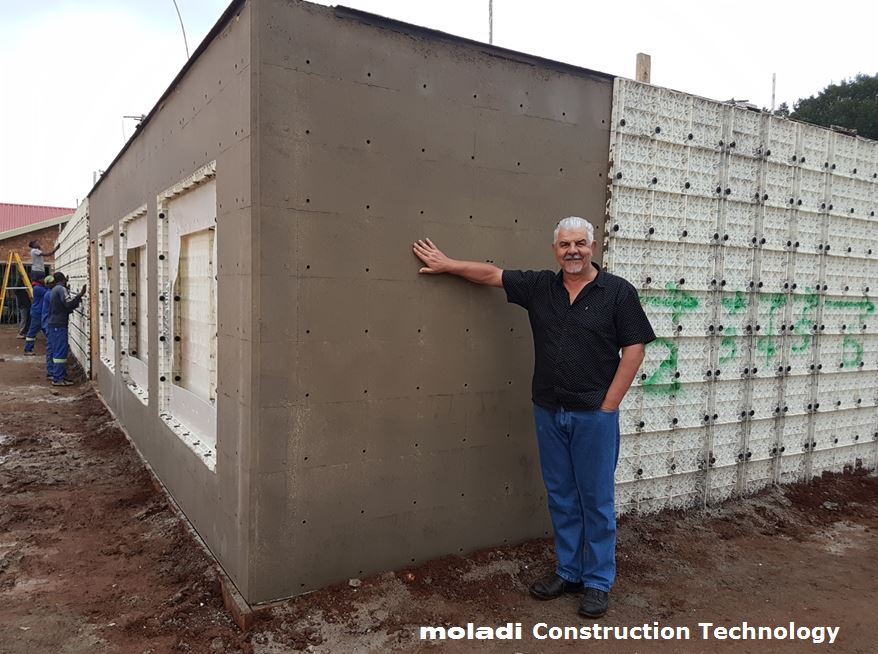
As we all know, the scourge of unemployment, poverty and homelessness in South Africa has never been worse with figures reaching unprecedented highs.
There is a system that enables jobless, unskilled South Africans to become entrepreneurs in the house building sector and build homes in their communities, at a fraction of the cost of traditional methods, and in less than a week.
This is the moladi building system which has been described, by no less and organization than the World Economic Forum (WEF), as “One of the world’s most scalable, affordable and socially accepted housing systems.” It has also been featured in the WEF article as “One of the 6 buildings that are revolutionising the construction industry.”
One of moladi’s greatest breaks was the construction of a 1,600-m2 courthouse, funded by the World Bank in Tanzania, which the WEF has named as one of six buildings to revolutionise the construction industry. The Kibaha District Courthouse was built for half the cost of using conventional methods (about $250/m2) and was completed in six months, rather than three years using traditional methods.
The system replaces cumbersome bricklaying with an approach similar to plastic injection moulding. Local unskilled labourers are trained to assemble reusable plastic injection moulded panels to create formwork for the structure. The formwork is erected on an engineer-designed raft foundation.
Doors, windows, electrical and water reticulation are mounted in the appropriate positions onto the formwork. Thereafter, the formwork is filled with a quick-setting aerated mortar, consisting of sand, cement and an admixture.
The house is left to set overnight and the formwork is removed the following day and re-erected on the next foundation. The superstructure is finished by fixing conventional roof, plumbing fixtures, ceiling, hanging doors, glazing and painting.
However, despite the success of the moladi construction system in 21 countries across Africa and the world, Hennie Botes, founder of the system, has spent many years in fruitless attempts to gain Government support for the system in South Africa.
But finally good sense has prevailed and his efforts have been crowned with success. He has since 2017 built 107 single- and double-storey schools for the Education Departments of the Western Cape, 62 classrooms for Gauteng Education Department at 24 different schools, 4 classrooms and ablution blocks for the Northern Cape Education Department to showcase the moladi technology and the huge reduction in time to construct. In addition housing projects have been completed and on-going in Trinidad and Tobago, Botswana, Namibia and Ghana. The new addition to the range of product moladi has produced in the past, is the 16 hospitals for Cameroon.
Most recently Botes presented the system successfully to the Councillors of the Worcester Municipality for a project that will see the construction of 800 houses. And there will certainly be more now that the benefits of the system are being recognised in South Africa at last.
However, not satisfied, Botes is now passionate about creating community cooperatives that will enable people to access state funding more readily.
He says: “The reality is that contractors build for profit, developers develop for profit and architects design structures for the top of the pyramid – beautiful buildings that most dream of but cannot afford.
“So a new ‘disruptive’ process has to be developed to allow the other 90% – the shack dwellers, the poor, the unemployed or the neglected market to help themselves. The built environment status quo does not see this as a market as their currency is dollars and this ‘client’s’ currency is sweat equity.
“Many big construction companies have gone insolvent. Overheads are too high for low-cost affordable housing. The new construction company (the cooperative) would be made up of newly skilled workers within the community. This ‘new’ entity is free from high overhead costs, generating an income by producing product for the neglected market and empowering people to help themselves.
“In this process people benefit from producing a home rather than simply appointing a contractor to build a house for government to hand over to an unemployed person,” he concludes.
With his persistence, passion and…. patience, if anyone can disrupt the affordable housing market, Hennie Botes is the man to do it. The future, as they say, is upon us. Watch this space!
More information from moladi, Tel: +27(0)41 379 2600 / email: [email protected] / www.moladi.co.za
More news
- REFRATECHNIK ASIA NEW ASSOCIATE CORPORATE MEMBER OF WCA
- PART 5: SA’S TRADE DILEMMA: A PODCAST DISCUSSION WITH DONALD MACKAY
- STATE-DRIVEN OPPORTUNITIES FOR SA CONSTRUCTION COMPANIES BUT MANAGING RISK IS A PRIORITY
- PART 4: SA’S TRADE DILEMMA: A PODCAST DISCUSSION WITH DONALD MACKAY
- CONCOR KICKS OFF OXFORD PARKS BLOCK 2A PHASE I PROJECT

